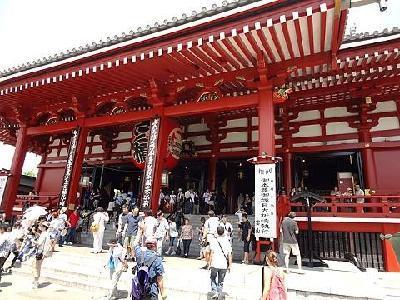Japan's tourism industry has been knocked into a deep recession. Foreign tourists, who normally contribute about $16 billion annually to the economy, canceled planned visits after the March 11 earthquake and subsequent nuclear disaster devastated the northeastern part of the country. The yen's surge this year against many other major currencies, including the US dollar, has done further damage.

The buzz of cicadas outdoes the voices of subdued vendors on a hot August day at Sensoji Temple, one of Tokyo's top tourist attractions. The lane leading to the temple contains dozens of stalls selling souvenirs, snacks and cold drinks.
July and August are normally the peak months for foreign visitors to Sensoji and the rest of Japan. But this summer their numbers are noticeably fewer.
A soft drink seller makes a transaction with a Japanese tourist: 100 yen, that is $1.30, for a half-liter bottle of oolong tea.
The vendor laments such sales are not as frequent as they should be.
He says the season is not as bad as he might have feared. He explains that he has seen worse times in his 20 years on the job, but there is a noticeable drop this summer in the number of foreigners.
Standing along the curb in the Asakusa district in the 34 degree heat is rickshaw driver Ryuta Nishio. He charges tourists 3,000 yen for a ten-minute ride. At the current exchange rate that has soared to about $40.
Nishio says the number of riders has dropped about 30 percent this August compared to the same month last year. It is not only the number of foreigners that has declined, he says, but domestic tourists as well.
But some foreigners are overcoming concerns about lingering radiation, seismic aftershocks and a worsening exchange rate. The yen has gained about 8.5 percent on the US dollar in the past six months.
Blaine Deitch, a retiree from southern California, says the trip has turned out to be worth every devalued dollar he has spent.
"That does take a dip in your pocket. That's going to stop a lot of people from coming. It almost stopped me," notes Deitch. "But my wife wanted to come back, so here we are."
Taiwan college student Teng Changcheng is on a five-day visit to Japan with family. She says the situation seems to have improved in the country since the calamity five months ago.
Teng says her family did not worry about making the trip because the Japanese government now seems to have the nuclear crisis under control.
US Marine Clayton Simpson is visiting from the US state of North Carolina.
"Despite the disaster, I've always wanted to come, so we decided this year was the year," Simpson says. "All the sites have been great but the people they've been extremely helpful. We don't speak a lot of Japanese ourselves. They've been very nice and helpful and it's been a great experience."
Japan's major tourism organizations are running publicity campaigns to reassure visitors. One promotion says Tokyo's radiation levels are lower than those in New York, Hong Kong and other major destinations.
Some hotels are slashing room rates amid a continuing dip in bookings by foreign tourists, although business travelers are trickling back in.
Many in the travel industry believe, however, it could be another year before overseas leisure travel bookings return to previous levels. They warn the industry could suffer further setbacks if another damaging earthquake hits, or the strong yen continues to reach new record highs.
rickshaw: also called jinrikisha, a small two-wheeled passenger vehicle drawn by one or two men, used in parts of Asia 人力車
Summer heat stifles Tokyo as Japan rebuilds economy
強(qiáng)震引發(fā)婚姻思考 日本流行“離婚典禮”
Chinese tourists start returning to Japan following earthquake
(來(lái)源:VOA 編輯:崔旭燕)
